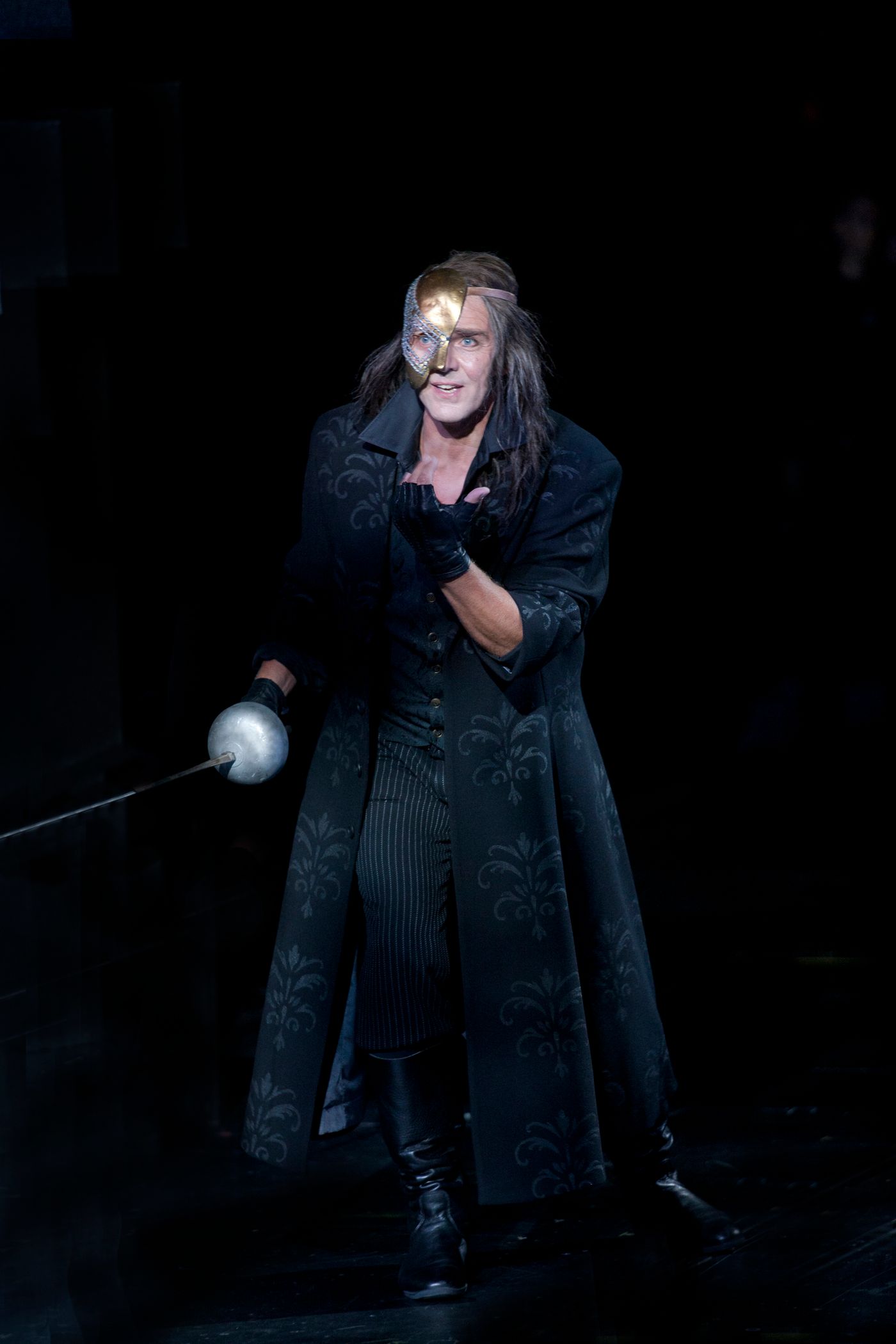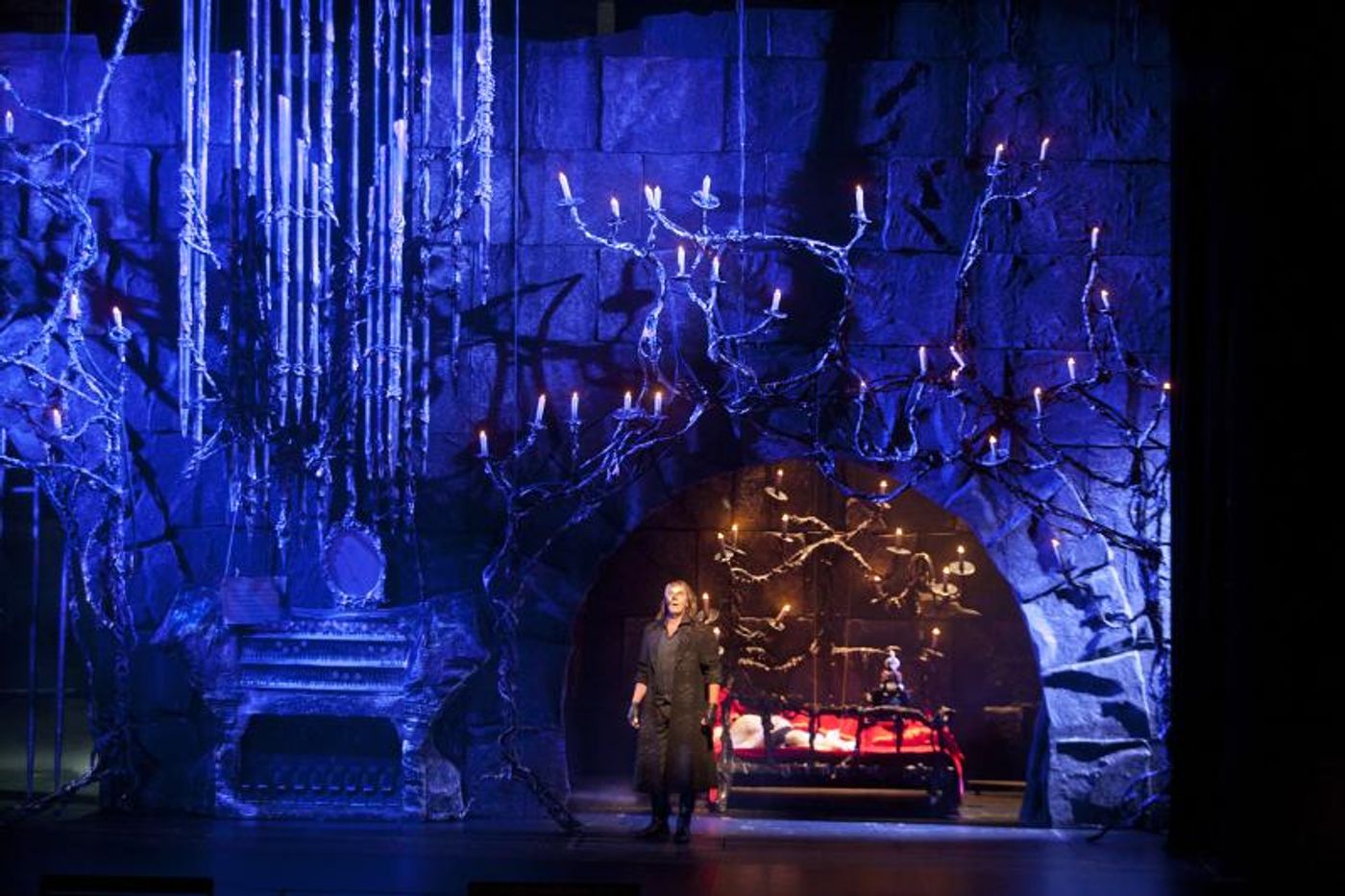Interview: ILKKA HAMALAINEN is the THE PHANTOM OF THE OPERA at the Finnish National Opera

Ilkka and I sit down at the corner of comfy armchairs and tables in the Finnish National Opera. The atmosphere is exciting as we both are eagerly waiting on the interview. I tap the red button of the recorder app on my phone and so we start.
/So, Ilkka. You play the title role of The Phantom of the Opera. At what age did you know you're going to be an opera Singer?
- Quite late, probably at 25 or so. It wasn't the first thing I had on my mind. See, at first I was in a band, I was a rocker. It was the groovy 70's and we participated in this shcalger music (iskelmä) contest that one popular music magazine arranged. There wasn't such thing as Idols you see. We succeeded and thus I was spotted; I was quite thin and I had this long, fair hair back then, and surprise, surprise, I was asked if I was interested to play Jesus in the coming musical of Jesus Christ Super Star at the theatre of he city of Kotka.
/Ooh, amazing! Even though you didn't have any kind of training in acting?
- No no! I had only rock 'n' rolled like mad my youth and that's it! Certainly it was amazing, it was around 40 years ago. From that I got really enthusiastic, thinking that what if I started to train my voice. I went to study in the music academy. I started to study music theory and notes, I was barely 20. I got the feeling that I'm in a hurry and so the intense phase of studying started. I was always with my headphones on, studying music, the classics and the new ones. So I became a professional musician by a coincidence, by drifting into it.
/Was the role as The Phantom of the Opera a dream come true?
- The way it occurred, yes! Sure thing. There was actually a public casting so that anyone could audition. During that time I was a part of the choir here, at the National Opera. It was a little vague situation, unfortunately, because the choir was told not to audition: "we need you as a choir and we do know what you can do." Of course it wasn't fair or suitable and many choir people complained about it. We thenceforth also got our chance to audition. Everything happened in somewhat harmony, luckily, but as I said, it was a little vague and they mustn't have had thought it through then.
/The performance I got to see on 6th of November was the 60th one. How was it for you?
- Well, to me it was probably the 30th or 35th one. The situation was interesting, because we got a completely new Phantom performer to our cast. It ended up so that after the hiatus of three years I only got one proper rehearsals before my first performance of 2018. With the conductor we only met at the sound-check rehearsals.
/Ooh, okay. Well, in the particular performance I went to there was a technical issue as the chandelier didn't raise up to the ceiling. Has there been any other technical issues before?
- Well it's not so common. It's a little hustle what begins of it: the show is put on halt as soon as possible and in the backstage red lights turn on everywhere instantly. Naturally, as anywhere else, our motto is safety first.
/Absolutely! Do you think it affected the performers, did you see any grumpy faces at the backstage?
- No no, I don't think so. The biggest effect was probably on the audience. I've done a long career and I can say that these things happen. And something worse could have happened-- thank God the chandelier didn't end up crashing on someone's head! Of course by the means of the show there was an important part going on as we would have drifted to the past as the chandelier would have risen to the ceiling, and in that show it had to be done from the beginning, so it lacked the certain kind of effect.
/I agree. But there certainly was a meta stage to the whole performance then as there was a scene within the play where there has happened a "technical issue". I certainly heard some giggles from the audience during that scene.
- Yeah! It came to my mind when I was there backstage that if the manager of the show would have had little discretion they could have put my mic on and I could have sung: I'm here... The Phantom of the Opera!
/I totally agree! But I do understand the fuzz that was going on and that there are so many people in this megaproduction that it wouldn't have been possible with such a short notice and hustle, and as you said, safety first.
- Yes.
/But okay. What characteristics of the Phantom are closest to you? As Stanislavski has said: find yourself in a character and a character within yourself.
- Definitely the sensitivity. The surface can be whatever but the core remains the same. We are both sensitive people.
/Why do you do Opera?
- When I was studying music and I was around 30 I felt that I'm not happy with my singing technique nor the way my career had gone. We did Rise and Fall of the City of Mahagonny at the Alexander's theatre and I was sure that this is the last gig I'll do that I'll stop my career; no one needs a singer with such a poor technique, not even me myself. But then, as if a voice from heaven, a friend of mine from the Opera told that there's a Russian bass-singer whom you should try to learn from. I took the note and after a couple of times rehearsing with him I sensed that things started rolling. Then I set a 5 year goal that if I'm not putting bread on the table by singing at 35 then I'll stop. And then I got better and the music took me with even more strongly. And here I am!
/Did you do any other jobs in addition to singing and being a musician?
- Yes, I studied to be a piano tuner-technician and for example currently here at the Opera I'm doing those jobs. I've helped our main tuner for 10 years but now he's away for a while and I'm doing those things now.
/Okay, wow! Then, Why has The Phantom of the Opera stayed for so long as a story and what is the magic in it?
- I doubt the story itself would have stayed so long if there wasn't Webber's music in it. The novel itself is kinda naive I'd say. Webber has such a talent to create such earworms you know.
/I agree! I think one of the best parts of the show was after the interval when the orchestra played pieces from all of the songs we'd heard. That was amazing.
-Yes, definitely.
/Then what about the physique of the Phantom? I'd always imagined that he'd be slow and eerie, but me and my friend discussed how he, also the other Phantom actor in the cast, on the opposite had kinda primal way to move.
-I've only thought it in a way that Phantom has been doing much physical work in his life, of which you can read in the novel. He is kinda aristocrat in a way, but little by little during the course of his life he's been crushed. He's been a phenomena in a circus, an ugly one everyone has come to see, after all. Now he's been able to hide it and is capable of living a normal life, but alone. And then comes this bloody kiddo (Christine) and breaks all of this; Phantom has control over everything else in his life, everything else than the feeling of falling in love. Then his world changes and breaks at least in the part where the mask is being taken away.
/Okay! Then the final question: Why should everyone come and see The Phantom of the Opera and what can the audience get from it?
-It gives hella good music and even though it's not an opera, but a musical performed in an opera, it's a great way to get familiar with our National Opera's atmosphere. Also, in my opinion, there's bunches of good acting as well, even though it isn't necessarily the most important thing in pieces like these. It's so wonderful to go and see something that moves you to tears, and nothing is as cleansing as crying for no reason so to speak. When you empathize with characters whose story is being shown on stage, it's so cleansing to cry, thinking like: yes, something can still move me.
Well said from Ilkka.
The Phantom of the Opera runs in the Finnish National Opera till 12.1.2019
Photo: Stefan Bremer
Article: Rosanna Liuski

Videos



